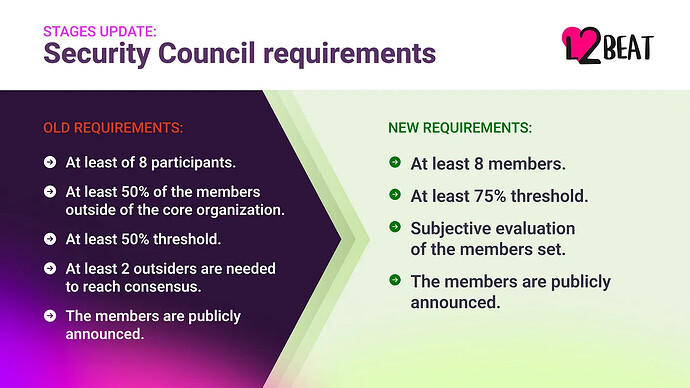RPIP-33: Implementation of an On-Chain pDAO
Presently, the team has control over the pDAO “guardian”. This allows the team to immediately disable features of the protocol that may protect against loss of funds in the case of a protocol bug or exploit. This proposal removes this safety net. As a compromise, this proposal introduces a “Security Council” which has limited power to make immediate changes to the protocol. This Security Council needs to be maintained to always comprise active members who can react to potential threats.
Security Council membership is a serious role and the pDAO SHOULD develop strong entry requirements and processes for routinely flushing stale members. The development of these requirements and processes is left for a future RPIP.
Until we agree on how to appoint a security council, the guardian (controlled by the team) will be the sole member of the security council.
This topic is to discuss the requirements and processes to establish the security council.
The security council can currently do the following without a delay:
- Disable the deposit pool
- Disable creation of new minipools
- Disable converting 16 ETH minipools to 8 ETH
- Disable converting solo validators to minipools
- Disable RPL price updates
- Disable RPL and smoothing pool rewards submissions
(Complete list and more details are in the RPIP-33)
Points to discuss
Who can be on the security council?
What are the requirements to become a member on the security council?
If a security incident is reported each member should be able to evaluate it and decide how to react.
The more requirements we have for the members the fewer qualified candidates we’ll have.
Should the members be doxxed?
Should we have any restrictions? Like jurisdiction, conflict of interest, etc.
How many members?
How many members should there be on the security council and what should be the quorum?
The more the merrier because it’s harder to collude but many members and a high quorum can slow down the response.
Should there be any limits to how many people from the same cohort (e.g. Rocket Pool team, jurisdiction, etc.) can be on the security council?
Response time
How quickly are the security council members expected to react?
This will impact who will be interested in being on the security council and what kind of compensation they expect.
Can someone take some time off? How should this be handled?
Compensation
How much and how frequently should the security council members be compensated?
Drills
Should there be practice drills? If so, how frequently and who should organize them?
Punishment
What to do if a member fails to respond to an incident or doesn’t participate in a drill?
Election
How should the security council members be appointed?
Other duties
Are there any other duties the security council should perform? If we pay them we might as well make them earn it.
Leader
Optimism security council has one. They are responsible for writing post-morterms and run drills.
Should we have a leader? What are their duties? How are they chosen? What about compensation? What if they become unavailable?
Communication
How and where should the security members coordinate and be notified of security incidents?
Other
Anything else?
I suggest thinking about the answers yourself first before reading other posts.
